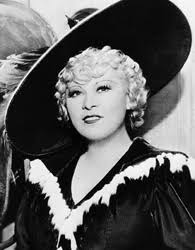
Mary Jane West AKA “Mae” was born on August 17, 1893 in Brooklyn, New York. Mae’s mother was a German immigrant and her father was “Battling Jack” West a featherweight prizefighter of English and Irish descent. She made her performing debut at a church social when she was five. By fourteen, she was a Vaudeville actress known as Baby Mae.
West pushed the limits of social norms. She wrote and starred in several successful Broadway plays, including “Sex,” which sparked controversy but also catapulted her into the spotlight. Her productions drew mixed reviews from critics but New Yorkers filled the seats each night, expecting racy plots and risqué jokes.
Hollywood studios provided Mae with generous offers. In 1932, the 38- year- old finally left the Big Apple and signed with Paramount Pictures. Her first movie appearance was in “Night After Night”. In a classic scene, a coat check girl admires Mae’s jewelry and exclaims, “Goodness! What lovely diamonds”. Mae replies, “Goodness had nothing to do with it”.
Mae wrote nine of the thirteen films in which she starred. Before shooting 1933’s “She Done Him Wrong” West was reviewing a large book containing pictures of leading men when she “glanced out the window and I saw this good-looking guy walk across the street. So, I said, “That’s about the best-looking thing in Hollywood: who is he?” So they said, “Oh, that’s Cary Grant. We haven’t used him in a picture as yet” I said, “Well, if this guy can talk, I’ll take him”. She gave Grant his first leading role and the film was nominated for the best picture Oscar.
Mae West was credited with single-handedly saving debt-ridden Paramount from bankruptcy. By 1936, she was the highest-paid star in Hollywood and the second highest-paid person in the U.S. after newspaper mogul William Randolph Hearst.
Partially because of West’s racy films, studios became the target of various morals crusades. Industry executives adopted a set of guidelines, commonly referred to as the Hays Production Code. Instead of dealing with the new puritanical rules, West set her sights on fresh horizons to conquer. She appeared on Edgar Bergin and Charlie McCarthy’s radio show and her lewd dialogue got her banned from that medium. She moved to Las Vegas where she performed on stage and in nightclubs.
West returned to Hollywood in 1940 to film “My Little Chickadee” with W.C. Fields. The pairing resulted in a successful movie but off-screen Fields and West despised each other. West would only make a handful of appearances on the screen before her death in 1980. These included the dreadful ‘Myra Breckinridge” and a guest slot on “Mr. Ed” (how did I miss that).
A Rich and Famous Lifestyle
West didn’t drink or smoke but loved dating younger men. Her long-term partner Paul Novak was 30 years her junior.
Her enormous ego compelled Mae to throw barbs at other female stars including Rita Hayworth and Elizabeth Taylor. She did have nice things to say about Marilyn Monroe before adding “Of course, she copied me.”
West resided in The Ravenswood, a Hollywood apartment building that also housed Judy Garland, Clark Gable and Ethel Merman. When West began to date Black boxing champ Gorilla Jones, management banned him from the building because of his race. West promptly purchased the building and terminated the ban. West also dedicated her time and resources to many charitable causes, focusing primarily on social welfare organizations especially those benefiting children.
Quotes
“When caught between two evils I generally pick the one I’ve never tried before”.
“I only like two kinds of men: Foreign and Domestic”.
“I generally avoid temptation unless I can’t resist it.”
“She’s the kind of girl who climbed the ladder of success wrong by wrong.”
“That woman speaks eight languages and can’t say ‘no’ in any of them.”
I still can’t believe I missed that Mr. Ed episode.
Have a great weekend.
If you liked this blog you will enjoy my highly acclaimed book, ‘Get Smarter- Be Amazed”. Visit www.tedcurtinstories.com for direct links to Amazon and Barnes and Noble.
H
a




